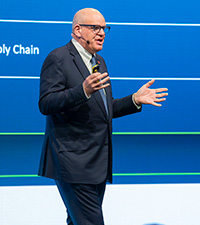
This year’s Working Capital Forum offered proof that the rise in ESG-related supplier finance programmes shows no sign of slowing down as companies use preferential rates to encourage better ESG performance in their supply chains. Like UK food group Asda, which says the vast bulk of its emissions live in its Scope 3. Speaking in a panel session, Joseph Prosho, Senior Manager, Sustainability, explained how the company has structured a programme around data collection and incentives that encourage suppliers to move up the ladder.
“The first step is to get your suppliers to share [emissions] data,” he said.
The next step in Asda’s iterative programme involves suppliers committing to reduce emissions and validate the Science-Based Targets Initiative (SBTI). Prosho stressed the importance of buy-in from Asda’s treasury team and a staggered introduction, and cautioned that corporates need to stay mindful of the burden integrating ESG places on their suppliers.

Sustainability at Mexican multinational cement group Cemex includes net zero targets, a robust circular economy strategy and integrating alternative fuels. Cemex has also rolled out a sustainable-linked financing programme and by 2030 the company wants to have linked 85% of its debt to sustainability.
Regional treasury director EMEA Angel Mendez described how a sustainable supply chain finance programme at the company allows certified suppliers to tap discounted financing, warning that integrating the programme amongst smaller suppliers is challenging because many lack sustainable knowledge and resources.
Treasury at Cemex has led shaping and driving the company’s ESG strategy. But delegates flagged the need for treasury to engage more with sustainability. Treasury teams are not incentivised to engage with ESG and a disconnect between treasury, sustainability and procurement exists.

Away from ESG, supply chain finance more broadly was another hot topic as more corporates continue to re-engineer their balance sheet and boost supplier relationships. Like Mr Price, the South African retailer, which rolled out a supply chain programme in 2021 that spans 1,047 suppliers in 29 countries working with Addendum, the largest supply chain finance provider in Africa.
Other corporates sharing their SCF journey referenced the importance of leadership and buy-in from the top. Like Emma Hayward, Group Treasurer at UK auto engineering group Dowlais which has transformed its financial processes by introducing supply chain finance alongside new cash management and treasury management solutions.
“Rolling out a supply chain finance programme on top of a treasury job is tough,” she reflected, stressing the importance of working with partners.

Embedded finance also made the agenda in a reflection of how more corporates are using it to drive revenue, particularly as retailers’ sales shift online and the number of physical stores falls. Expert comment came from Slawomir Chmiel, CFO at Poland’s online retailer AllegroPay who has overseen the roll out of embedded receivable finance at the company by building proprietary fintech products. He explained how it has helped drive sales growth by offering extended terms to thousands of customers. Delegates heard how corporates will increasingly build in alternative payment methods like buy now pay later (BNPL) to draw in revenue.
Later, Mastercard’s SVP and Head of Product for Global Treasury Solutions Brooke DiNatale, and Matt Wreford, CEO at Demica continued the discussion, discussing how embedding finance options into existing procure-to-pay platforms can remove friction and add optionality to supplier payments, and the crucial role of APIs in its evolution.
Receivables financing

Other key conference themes included receivables financing, recognising these programmes can now be managed at a scale thought to be impossible a few years ago. Delegates’ focus turned to the technology providers pioneering progress in the space like Taulia, Prime Revenue and Kyriba. Representatives pitched how their receivables finance technology is a most effective, fast and scalable way to release working capital.
Elsewhere, delegates enjoyed Mickey Ben Moshe, VP Treasury and Head of Working Capital discuss how Teva Pharmaceuticals has promoted the importance of cash and working capital management across the organisation; Rabobank’s Menno Middeldorp pondered the implications of a Trump presidency and author Bram Desmet’s insights on re-thinking supply chains.

